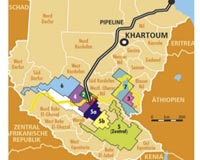 |
New Orleans, Louisiana (AFP) June 23, 2010 Oil spewed unhindered into the Gulf of Mexico Wednesday as BP had to detach its containment cap and make repairs after a remote-controlled submarine crashed into it. The setback marked a terrible start for American Bob Dudley in his first day as BP's disaster coordinator, brought in by the firm to replace gaffe-prone British CEO Tony Hayward after weeks of flak over his response to the crisis. Admiral Thad Allen, leading the US government effort to confront the nation's worst ever environmental disaster, said the "top hat" containment cap had been removed for inspection after crews detected gas. "They indicated the problem was a remotely-operated vehicle had bumped into one of the vents," Allen said, adding that the vent had then closed, creating pressure that had forced up gas and other materials. The containment system, which works by trapping leaking oil and then siphoning it up to a container ship, could be reinstalled later Wednesday after checks are complete, BP said. But Allen warned that if the siphon pipe had to be refitted, restarting containment operations would likely take much longer. The cap had been siphoning away some 25,000 barrels of oil each day, and removing that capacity would leave between 35,000 and 60,000 barrels of crude flowing directly into the sea, according to the latest US government estimates. Completing a disastrous start for Dudley, Allen said two people involved in the clean-up efforts had been reported dead. One was killed in what he described as "an accident regarding a swimming pool," but no details were provided about the death of the second individual, who had been working off the Mississippi shore. Dudley assumes command from Hayward, who faced massive criticism of his handling of the spill, including accusations of insensitivity, and was ridiculed as out of touch. Unlike Hayward, Dudley is an American citizen who spent much of his childhood in Mississippi, one of the four southern US states whose coastlines face an environmental catastrophe. The news came as administration officials pledged to redouble efforts to freeze new deepwater oil drilling while they assessed safety regulations. On Tuesday, Judge Martin Feldman overturned a drilling moratorium authorized by President Barack Obama in the spill's aftermath, saying it was "arbitrary and capricious." But the White House pledged to appeal the decision and Interior Secretary Ken Salazar told lawmakers at a hearing on Wednesday that he would soon issue a new order to ensure the freeze sticks. "We will move forward with the executive authority which I have to make sure that the moratorium stays in place," Salazar said. The Obama administration believes the decision flies in the face of mounting evidence that there are serious safety risks with the 33 deepwater wells in question. But oil workers and executives argue the freeze is driving away business, and Louisiana Governor Bobby Jindal, a Republican, said the moratorium hurt the same people already being negatively impacted by the spill. An internal BP document released by a US lawmaker this week showed the firm contemplated a worst-case scenario of up to 100,000 barrels, or 4.2 million gallons, a day leaking. America's worst previous oil spill, the 1989 Exxon Valdez disaster, dumped nearly 11 million gallons off the Alaskan coast, but even under the low end of current estimates, more than 90 million gallons have entered the Gulf. BP has spent two billion dollars so far on cleaning up the spill and compensating residents and businesses facing ruin. The nine-week-old spill began with an April 20 explosion that ripped through the BP-leased Deepwater Horizon rig, 50 miles (80 kilometers) off the Louisiana coast, killing 11 workers. More than 125 miles of Louisiana coast have been contaminated, shutting down fishing operations and triggering long-term fears for the region's already endangered wildlife.
Share This Article With Planet Earth
Related Links Powering The World in the 21st Century at Energy-Daily.com
 Sudan: New oil wells could avert civil war
Sudan: New oil wells could avert civil warKhartoum, Sudan (UPI) Jun 23, 2010 Sudan's government is reported to be exploring for oil in the war-torn Darfur region, which, if successful, could halt a threatened renewal of one of Africa's bloodiest civil wars. The secessionist south is expected to vote for independence in a 2011 referendum, part of a 2005 peace agreement that ended 21 years of war in which an estimated 2 million people have died. But since m ... read more |
|
| The content herein, unless otherwise known to be public domain, are Copyright 1995-2010 - SpaceDaily. AFP and UPI Wire Stories are copyright Agence France-Presse and United Press International. ESA Portal Reports are copyright European Space Agency. All NASA sourced material is public domain. Additional copyrights may apply in whole or part to other bona fide parties. Advertising does not imply endorsement,agreement or approval of any opinions, statements or information provided by SpaceDaily on any Web page published or hosted by SpaceDaily. Privacy Statement |